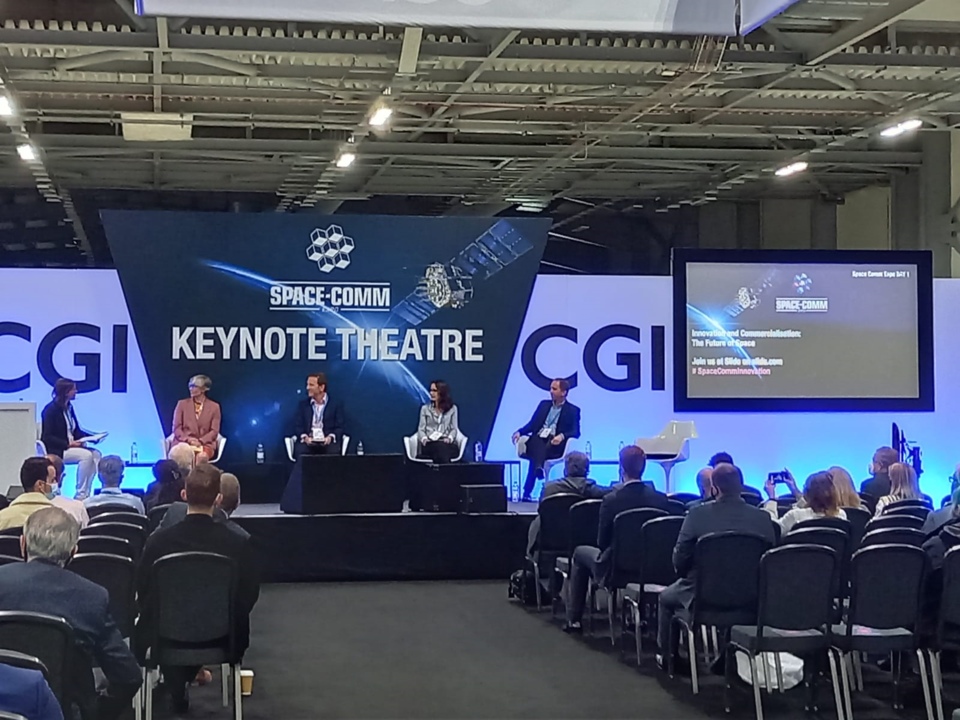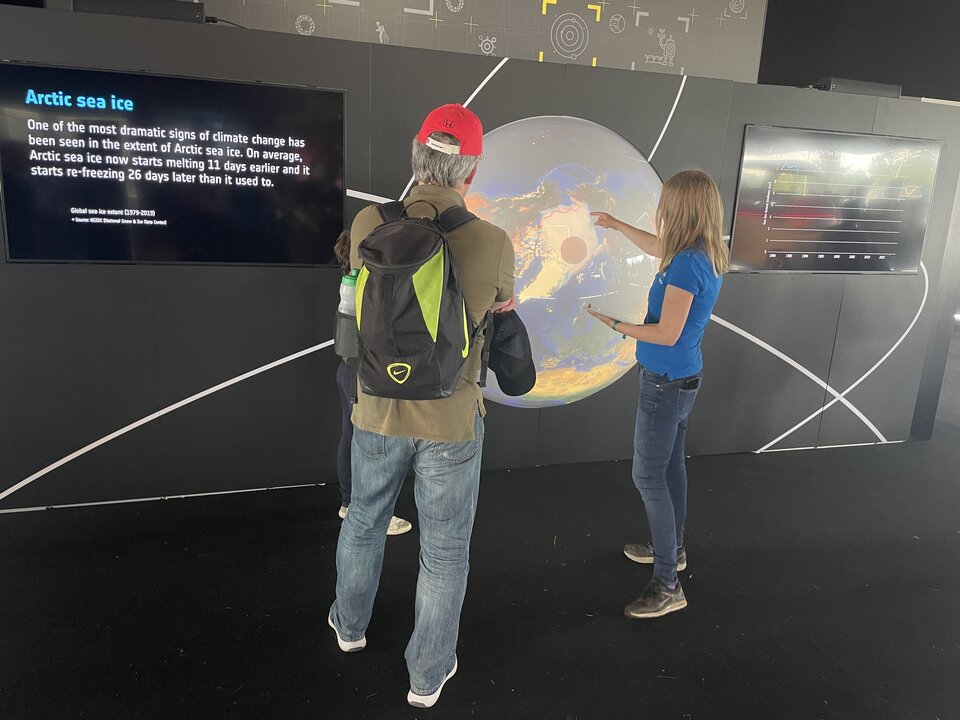ESA returns to live events in the UK
ESA highlighted how satellite technology fosters commercial innovation, improves everyday life, and helps to protect the environment at two live events in the UK last week.
The events – which adhered to measures put in place to protect the health of attendees – marked an opportunity for ESA to reconnect with industry and the public in person after a 15-month hiatus driven by the pandemic.
The agency took part in the Space-Comm Expo in Farnborough on 7-8 July, and the Future Lab exhibition in Goodwood, West Sussex on 9-11 July, which explored how cutting-edge technologies are helping to protect the planet.
Around 2000 people attended the Space-Comm Expo to do business, network, and explore the latest commercial developments in the UK space industry.

ESA’s Director of Telecommunications and Integrated Applications Elodie Viau joined the UK Space Agency’s Deputy Chief Executive for Programme Delivery Ian Annett for the event’s opening address, with Viau focusing on how ESA boosts the British and wider European space industry, creating jobs, tackling challenges on Earth, and fostering prosperity.
Viau also led a panel session with industry partners on the importance of space-based innovation in improving everyday life, which included representatives from Surrey Satellite Technology Limited, QinetiQ, Telespazio UK, and the Satellite Applications Catapult.
Several of ESA’s key telecommunications developments were outlined, such as advanced space-enabled 5G and 6G networks, ultra-fast optical communications, ensuring resilient connectivity, and a lunar telecommunications and navigation system.
The panel discussion covered many other aspects of the commercialisation of space, including how ESA’s Directorate of Telecommunications and Integrated Applications partners with space-based industries – as well as non-space companies – to accelerate the development of innovative satellite-enabled solutions.
Tiny satellites make big impact
These efforts were demonstrated by dozens of firms that exhibited at the conference, including satellite-powered data company Spire Global UK and satellite manufacturer In-Space Missions.
Two nano-satellites developed by Spire, and one developed by In-Space and partners, were launched earlier this month as part of ESA’s efforts to help space companies demonstrate new commercial services.
They will be used to monitor climate change, forecast the weather, track ships at sea and aeroplanes in flight, boost sustainability, and connect electronic devices to one another through the internet of things, enabling people to stay connected to one another everywhere and all the time.
The UK-driven satellites were developed as part of ESA's programme of Advanced Research in Telecommunications Systems (ARTES) through its Pioneer programme, which is a Partnership Project co-funded by the UK Space Agency.
Some 15 satellites are already operational in orbit thanks to the ARTES Pioneer Partnership Programme, and a further 12 satellites are due to be launched in the coming two years.
ESA also supports smaller start-up companies in the development of space-connected technologies through the agency's Business Applications Space Solutions programme.
These include fledgling firm Magdrive, which is developing technology designed to improve the in-orbit management of the growing number of tiny satellites being lofted into space.

A rocket is needed to launch a mission, but some satellites in orbit are equipped with smaller onboard engines of their own, which are used to control their orientation and direction.
These systems are currently geared towards larger satellites, so Magdrive’s ambition is to develop a small and high-powered electric thruster that will enable smaller missions to complete complex operations in orbit.
ESA’s Business Applications Space Solutions programme was also present at the event. The programme helps European businesses develop space-based technologies and applications in every area of the economy, including healthcare, logistics, agriculture, environmental monitoring and many more.
Accelerating climate action
The theme of sustainability was continued at the Future Lab exhibition, which is part of annual motorsport event the Goodwood Festival of Speed.
Future Lab showcases cutting-edge technologies designed to make the world a better place – and ESA’s contributions showcased how space technology is being used to monitor and mitigate climate change.

At the centre of the exhibition was an interactive 3D globe illuminated with ESA climate data, enabling attendees to witness the rapid changes to Earth’s ice sheets, glaciers, oceans and forests through the eyes of Earth observing satellites.
The globe displayed datasets generated as part of the agency’s Climate Change Initiative, which transforms space data into environmental observations that are improving global understanding of Earth’s changing environment, and helping governments and businesses to reduce planet warming emissions.


